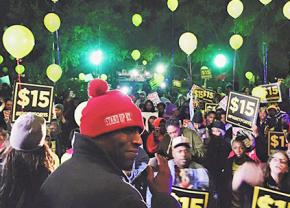No debate about needing a living wage
reports from Charleston on how workers took their struggle for a living wage to the Democratic Party presidential candidates debating in their city.
THE CANDIDATES for the Democratic Party presidential nomination who gathered for their fourth debate in Charleston, South Carolina, on January 18 had many questions to answer--but they failed to discuss the most important issues facing workers today.
Luckily, the candidates and other party leaders weren't the only ones who showed up. More than 1,000 activists from the Fight for 15 movement rallied outside the debate to demand a living wage and respect for low-wage workers.
In addition to the call for a $15 an hour minimum wage, workers demanded union rights, health care and an end to racist policing and discrimination against undocumented immigrants. Buses brought protesters from as far as Richmond, Virginia, to make their voices heard. Several banners read, "Earn our vote!" pointing to the past failures of Democratic politicians to improve conditions for workers.
More than 100 Charleston fast-food workers walked off the job earlier in the day, joining up downtown for the rally. Speakers told horror stories of draconian corporate policies and the struggles of raising families on starvation wages. Most of the activists were African American, many of them teenagers or young people already disillusioned with low wages and mistreatment.

Service-industry workers comprise the largest sector of low-wage workers. More than 89 percent of fast-food workers make less than $9 an hour. Women and people of color also work for disproportionately low wages. Women account for 60 percent of the low-wage workforce. Therefore, the struggle for improved working conditions must also be a struggle for equal pay and for opportunities for minority workers.
Although conservatives claim that raising wages would result in a rise in prices, independent studies, such as one by researchers at Purdue University, have found that raising the minimum wage to $15 an hour would result in only modest price increases, including 4 percent or less in fast food.
Charleston was an important center of struggle in 2015, after white supremacist Dylann Roof murdered nine Black churchgoers at Emanuel AME Church. The anti-racist response to the shooting pressured political leaders for the removal of the Confederate flag from the statehouse grounds. Fight for 15 protesters at the debate showed solidarity with the victims, with a silent march past the church and a memorial with flowers.
South Carolina Gov. Nikki Haley has made the Republican response clear, stating that union jobs are not welcome in South Carolina because they would "taint the water." Haley's comments are consistent with the long tradition in the Southeast of attacking unions and working people's standards of living.
BEFORE THE debate, Bernie Sanders stopped to address the rally crowd. He voiced agreement with the demands of the protesters, arguing, "Americans should not have to work for starvation wages."
Sanders supports the call for a $15 an hour minimum wage, and his campaign's message against inequality and poverty resonates with the anger felt by those at the protest. Unfortunately, Sanders has decided to pursue his presidential campaign inside a party that is also responsible for stagnating wages and attacks on union rights. Although the Republicans are known for unapologetically attacking the working class, Democrats share the responsibility as the second-most enthusiastic party of neoliberalism.
Although the Southeast has suffered harsh attacks on workers' rights, public services and Black lives, it is no longer unique. Neoliberal politicians have brought right-to-work laws and cuts to social services to all corners of the U.S. Candidates like Donald Trump point to states like South Carolina as a model for the future of American politics.
Raise Up for 15, the Southeast chapter of the Fight for 15 movement, is aptly named. After decades of attacks on our rights, workers in the Southeast and across the nation need to raise up--not only to resist falling wages, but to form organizations that can lead in the ongoing struggles.
History tells us that even when workers win major improvements in our workplaces, we need organization to respond when employers return to the offensive. The Southeast needs to learn how to fight back, and fighting for $15 an hour and a union is a great place to start.


